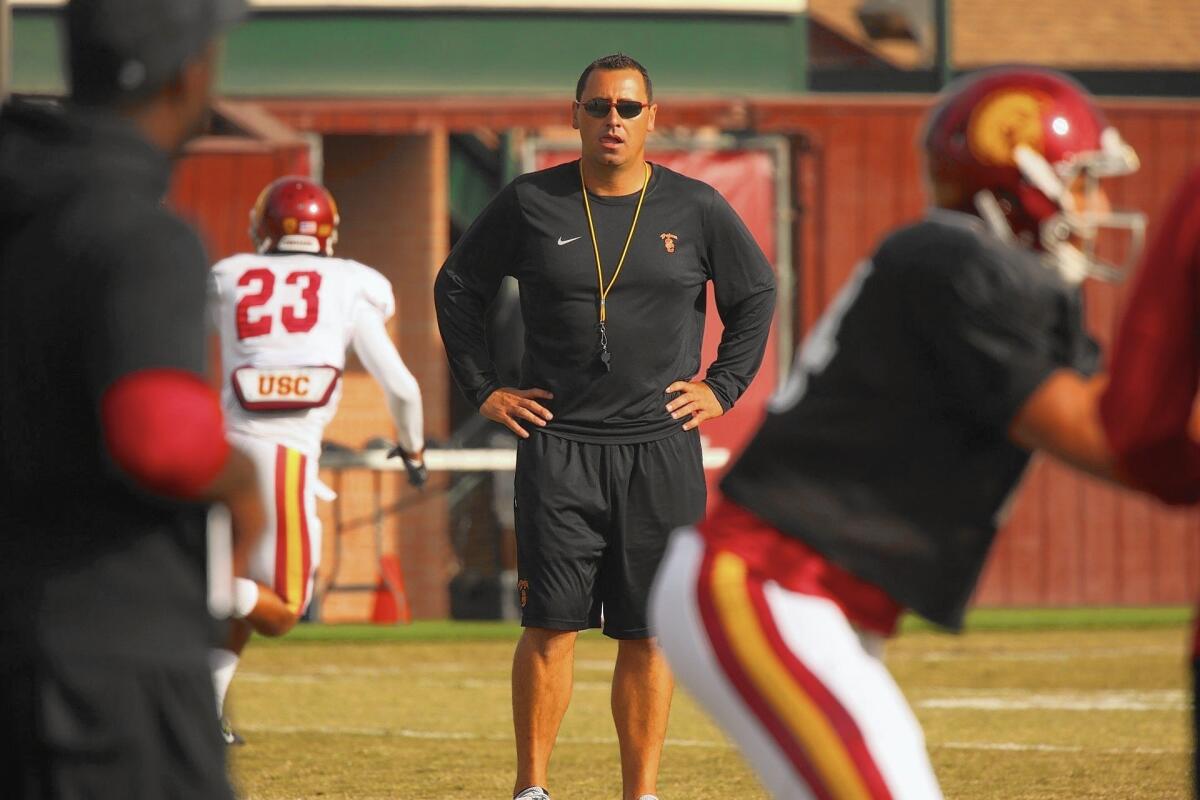USC’s Sarkisian isn’t first coach to give his school a black eye

When USC head football coach Steve Sarkisian gave a slurred speech punctuated with an expletive at an alumni event last weekend, he joined a long list of athletic coaches who have given their schools a black eye.
In the annals of bad football coach behavior, Sarkisian’s transgression is minor, experts say, especially since he does not have a public history of alcohol or substance abuse.
Nonetheless, Sarkisian’s conduct has put his bosses in a difficult position, similar to the administrator who oversaw a coach who went to rehab after crashing a car on the way to a team flight or the one who dealt with an intoxicated coach who allegedly punched a police officer.
“You have to show that you’re taking this seriously as a real leadership moment,” said Kenneth L. Shropshire, a professor of legal studies and business ethics at the Wharton School of the University of Pennsylvania.
USC’s handling of the event’s aftermath has drawn mixed reviews from several experts. Sarkisian apologized the day after the event and said he would seek treatment. Athletic Director Pat Haden issued a short statement, saying he had spoken to the coach but that “the details of our conversation will remain between us.”
On Thursday, Haden said in a text message to The Times that “we outlined a plan of action with Coach Sarkisian and that is between us.”
A USC spokesman said the school couldn’t discuss the plans in detail because of privacy issues.
In interviews, Sarkisian said his erratic behavior could partly be blamed on a mix of unspecified medication and alcohol. He offered few details.
Some said USC should be clear about what, if any, consequences there are for Sarkisian’s behavior. If players have to sit out a game or so for not following team rules such as attending practice on time, “why not do the same thing for a coach?” Shropshire said. “It seems like a game or two is what we should be talking about.”
USC is in an awkward position, experts say. Under federal privacy laws, school officials probably can’t discuss any treatment or punishment Sarkisian receives without his permission.
But because Sarkisian is probably the school’s highest-paid and most visible employee, many want to know what, if any, consequences there will be for his behavior.
Sarkisian has not missed practice since the incident. But questions remain. If he orders his players to run a play in a game that fans or sports analysts don’t agree with, going for it on fourth down while in USC territory, for example, “the first question is will be if he’s ready to coach,” said Miro Copic, a San Diego State University marketing professor.
------------
FOR THE RECORD
11:49 a.m.: An earlier version of this article stated that Miro Copic is a University of San Diego marketing professor. He is a professor at San Diego State University.
------------
“Pat Haden is in a terrible spot,” Copic said.
USC President C.L. Max Nikias has declined repeated interview requests.
Pressure at USC to hold Sarkisian accountable could be especially intense, since Haden was hired in the aftermath of the football team’s NCAA violations, which resulted in the loss of scholarships. Sarkisian was one of Haden’s first hires.
“The bar is raised especially high at USC right now,” Shropshire said.
It’s unusual for coaches to continue to oversee teams while they are being evaluated for substance problems. After Oklahoma State University basketball coach Eddie Sutton crashed his car in 2006 on the way to a team flight, he took a leave of absence, went to rehab and later quit the team. Gary Moeller, who coached the University of Michigan’s football team, resigned shortly after he punched a police officer in 1995.
Sarkisian has said he does not believe he has a drinking problem but that he would undergo treatment to find out. The Seattle Times reported that Sarkisian was reimbursed nearly $1,000 for alcohol during retreats in 2012 and 2013, when he was the head football coach at the University of Washington.
Questions about drinking are “going to be a distraction for the team all season,” Copic said.
But Copic and Shropshire agreed that if Sarkisian does have to step down, both he and USC could recover quickly.
“We haven’t been very forgiving in the past” when athletes have made mistakes, Shropshire said. “But we’ve evolved where you’re allowed to redeem yourself.”
twitter: @byjsong
Times staff writer Gary Klein contributed to this report.
More to Read
Sign up for Essential California
The most important California stories and recommendations in your inbox every morning.
You may occasionally receive promotional content from the Los Angeles Times.











